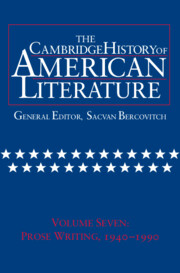Book contents
- Frontmatter
- Introduction
- The Drama, 1940—1990
- Fiction and Society, 1940–1970
- 1 War and the Novel: From World War II to Vietnam
- 2 The New Fiction: From the Home Front to the 1950s
- 3 On and Off the Road: The Outsider as Young Rebel
- 4 Apocalypse Now: A Literature of Extremes
- After the Southern Renascence
- Postmodern Fictions, 1960–1990
- Emergent Literatures
- Appendix: Biographies
- Chronology, 1940–1990
- Bibliography
- Index
3 - On and Off the Road: The Outsider as Young Rebel
from Fiction and Society, 1940–1970
Published online by Cambridge University Press: 28 March 2008
- Frontmatter
- Introduction
- The Drama, 1940—1990
- Fiction and Society, 1940–1970
- 1 War and the Novel: From World War II to Vietnam
- 2 The New Fiction: From the Home Front to the 1950s
- 3 On and Off the Road: The Outsider as Young Rebel
- 4 Apocalypse Now: A Literature of Extremes
- After the Southern Renascence
- Postmodern Fictions, 1960–1990
- Emergent Literatures
- Appendix: Biographies
- Chronology, 1940–1990
- Bibliography
- Index
Summary
Despite the emergence of writers who were moving in new directions, the late 1940s was hardly a stellar period in American fiction. Very few major novels were produced. Most of the important books, as we have already seen, either dealt with the war or reflected its aftermath, since very few events altered American life as much as this global conflict. Many novels that were much acclaimed at the time, such as The Naked and the Dead, All the King’s Men, The Young Lions, Guard of Honor, and Other Voices, Other Rooms, seem flawed or dated today; in some cases their authors (Mailer, Capote) went on to make their mark in strikingly different styles. The plays of Tennessee Williams and Arthur Miller and the hard-boiled films noirs of the era seem stronger today than the fiction of the period. The work of some novelists who were just beginning to write then, including Mailer, James Jones, Saul Bellow, Flannery O’Connor, Ralph Ellison, and James Baldwin, still feels vital and impressive today, yet their work belongs primarily to the literary scene of the next decade.
Nevertheless, the forties were the testing ground for everything that happened in American writing for the next twenty years. As the American economy moved from Depression and war production to affluence, consumerism, and worldwide geopolitical dominance, writers turned away from economic and social concerns to engage more with spiritual and personal issues. The radical politics and progressive social views that were so important between the wars lost favor, despite Harry S. Truman’s unexpected victory over Thomas E. Dewey in 1948.
- Type
- Chapter
- Information
- The Cambridge History of American Literature , pp. 165 - 223Publisher: Cambridge University PressPrint publication year: 1999



